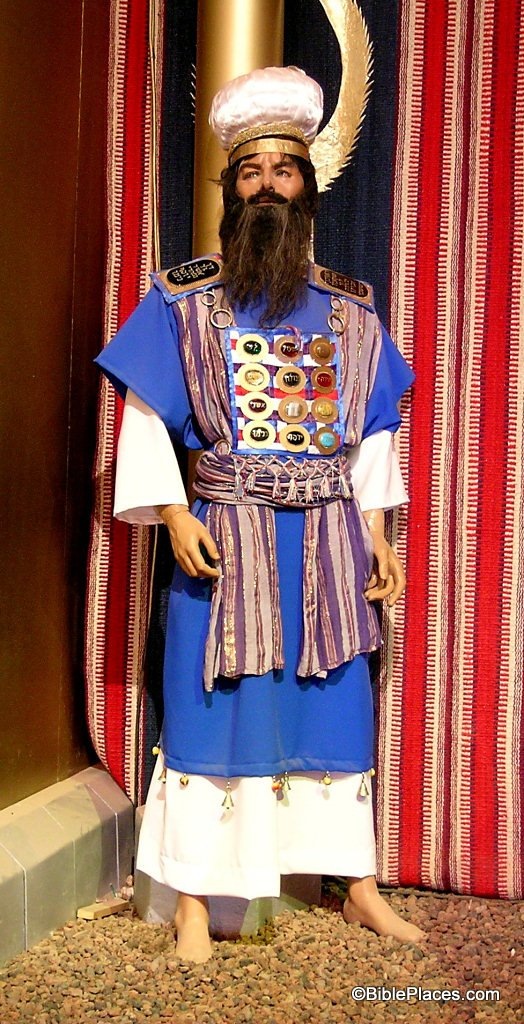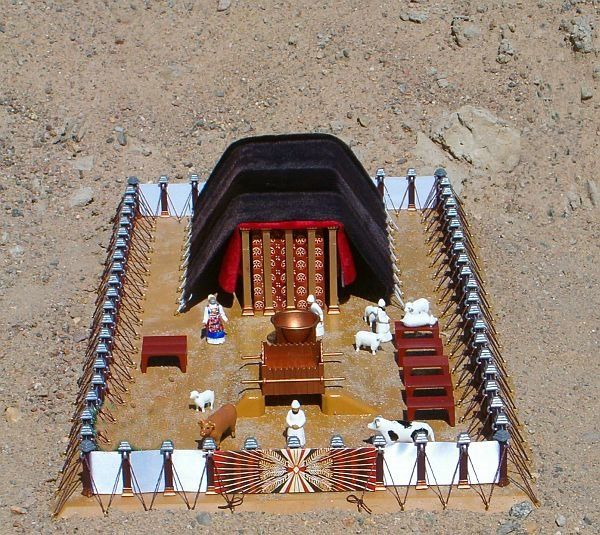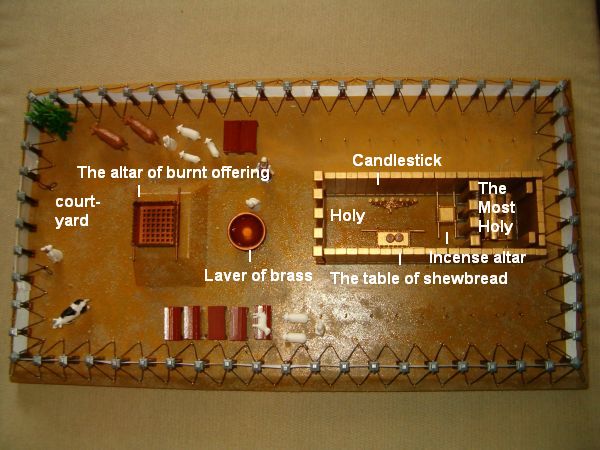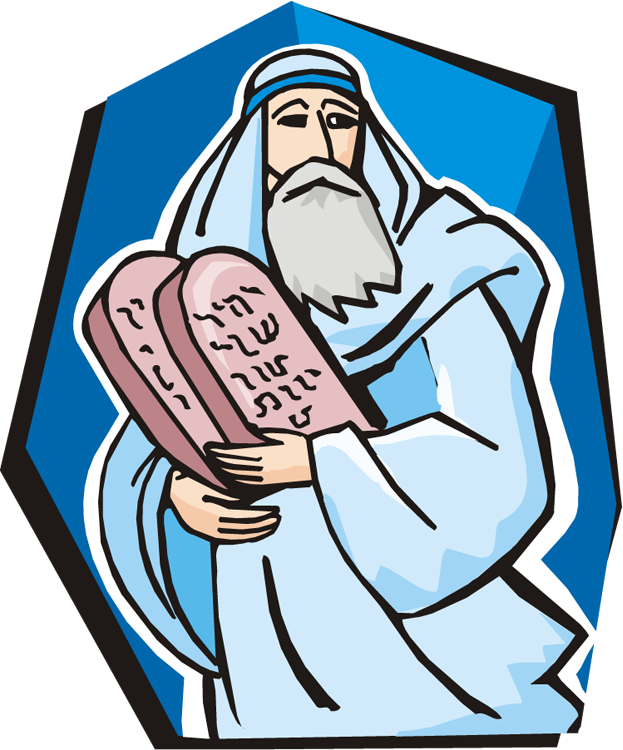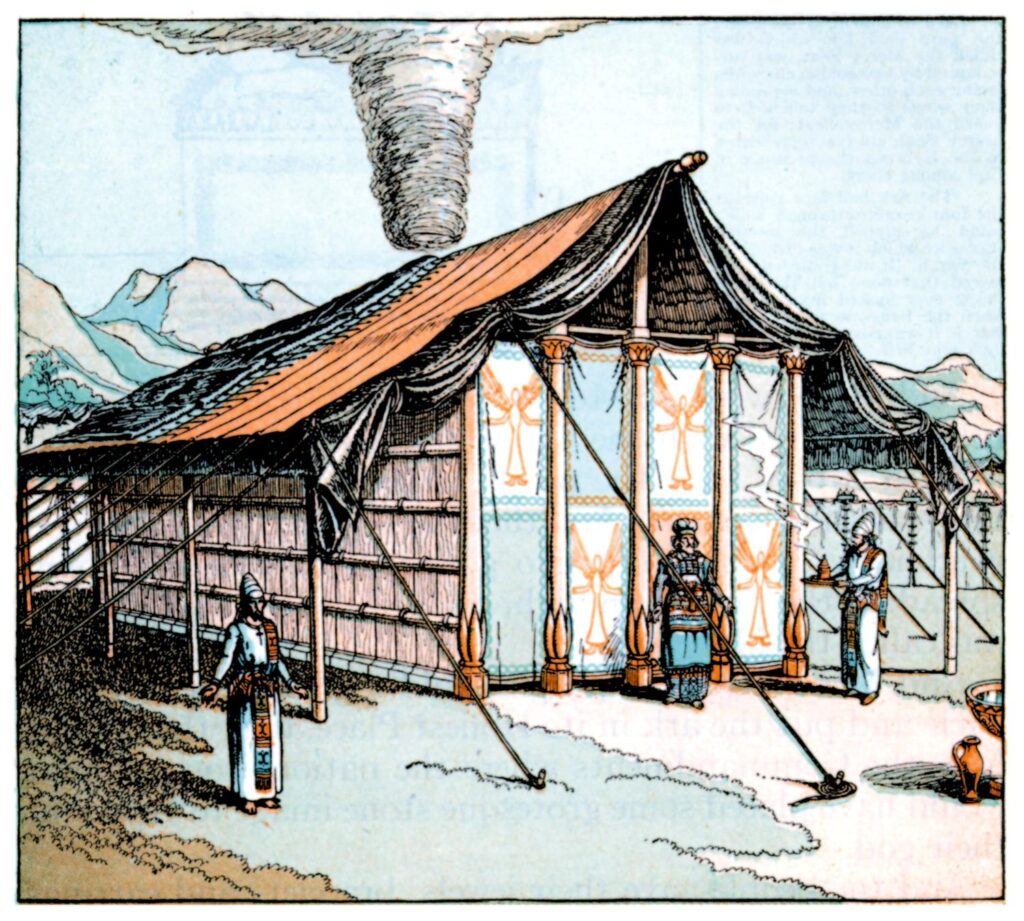
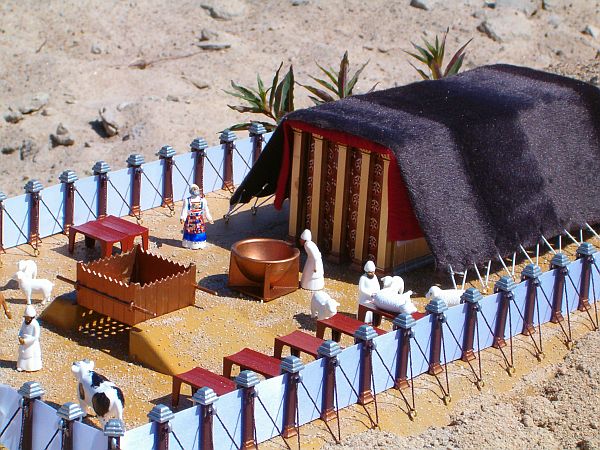
The Tabernacle of Moses was literally a three-dimensional gospel message tract. It is the visual demonstration of the whole message of the Bible in a building—the blueprint of the plan of redemption of wayward man. It was a functioning masterpiece of artwork demonstrating the Father’s love for his people, of his desire to commune and to communicate with Israel—his treasured possession, those he had hand picked and called out from the 70 nations of the world. Not only did the tabernacle involve the sense of sight, but the other four senses as well: sound, smell, touch, and taste. It also engaged and even challenged the heart, emotions, mind and spirit of man. The Tabernacle of Moses was a vehicle for the Creator of the universe to communicate with man using a panoply of communicative devices all of which pointed to the coming Messiah, the Redeemer of mankind who would die for the sins of the world to restore man into a loving relationship with his ever-loving, gracious, and longsuffering Father in heaven.
The Altar of the Red Heifer (Num 19:1–11)
The altar of the red heifer is where our journey through the Tabernacle of Moses begins; no! Rather this is where our journey toward the throne room of heaven begins, which is the very presence of the Almighty Creator of the universe. His name is Yehovah Elohim, and his arms are open wide to receive you, if you know the way to him.

This altar is the very spot where the earthling and the finite reaches out a feeble and virtually helpless arm skyward toward the infinite—the supreme Creator of all. Where a small, weak child extends his scrawny arms up to his all-powerful and all-loving Father, who towers above him, his head reaching into the clouds, or so it seems. This is the first of many steps that a mortal being takes as he or she begins to hearkens to and attunes their mind and heart to the flickering spirit deep inside their innermost depths. This is where the human begins to awaken to his deepest yearnings to know where he came from, why he is alive, where he is going, the meaning of life, his purpose and destiny, and, most importantly, to satiate the thirst and the intense desire to live forever—yea! to somehow achieve immortality.
So what is this all-important geographical spot where the One who has all power, who gave the gift of life to each human, and who long ago established and prescribed the one and only path that one must follow if they want to find themselves and, ultimately, to find him? It is at this spot where heaven demands that each person lose it all to gain it all; to lose himself or herself to find themselves; to become poor that one might become rich; yes, and to die that one might live.
This place of transaction is a literal altar where something and, eventually, Someone died so that you and I might live forever in the glorious, ethereal and supernal Presence of YHVH Elohim, the Creator of us all. And the Tabernacle of Moses shows us the way.
Thirty-five hundred years ago when YHVH instructed the children of Israel to build a glorified tent called the Tabernacle of Moses where he might dwell among them, lead and guide them into a special relationship with him, he also instructed them to build an altar in a special place outside that tabernacle. This is the place that those who would enter the tabernacle would first be required to visit to be cleansed and purified in order to come into the tabernacle. They had to be cleansed of any filth that prevented them from coming into the presence of their holy or pure and perfectly righteous Creator. That is to say, each person had to deal with the sin in his life. This was the transaction that each one had to make before taking another step heavenward, so to speak. They had to acknowledge their sinfulness, repent of that sin, and then be cleansed or pardoned of that sin. There was no other way to gain a ticket, so to speak, to go inside.
The ritual on this altar involved the sacrifice of a perfectly spotless red heifer cow that symbolized innocence or sinlessness. Those who were chosen to minister before YHVH in the tabernacle had to then take the ashes from the heifer that was sacrificed as a burnt offering, mix it with water and then be ritually purified by this lye water. Lye is found in ashes and, interestingly, was, in former times, the major cleansing agent traditionally used in soap. YHVH prescribed and accepted this cleansing ritual as a suitable precursor to initiate his servants, the Levites, to minister before him in the Tabernacle.
But this red heifer ritual was not an end all. Like everything in the Tabernacle of Moses, and like a sign on a highway that gives the number of miles to your destination, this ritual prophetically pointed to something or, more accurately, to Someone who was yet to come who would ultimately cleanse humans from their sins once and for all. Can you now see where this is going?
That Person was Yeshua the Messiah, and the spot was where he was crucified for the sins of all those who would make the transaction with YHVH Elohim, like the Levites of old, to acknowledge their sin, repent of it, forsake it and be cleansed of their sin filth by Yeshua’s blood. He was crucified as our sin atonement outside of the temple in Jerusalem in the very same area where the red heifer of old was traditionally sacrificed on the Mount of Olives. The writer of the Epistle to the Hebrews explains this as follows:
We have an altar from which those who serve the tabernacle have no right to eat. For the bodies of those animals, whose blood is brought into the sanctuary by the high priest for sin, are burned outside the camp. Therefore Yeshua also, that He might sanctify the people with His own blood, suffered outside the gate. Therefore let us go forth to Him, outside the camp, bearing His reproach. (Heb 13:11–13)
Yes, each of us must visit the cross of Yeshua and be sprinkled by his blood or cleansed of our sin if we want to come into the presence of Elohim (Eph 1:7; Heb 10:19–22; 1 Pet 1:18–19; 1 John 1:7). To enter the ancient tabernacle without proper cleansing was a death sentence, even as the wages of sin is death (Rom 6:23), and no sin can come into the presence of the most holy YHVH Elohim. All sin had to remain outside the precinct where YHVH abode then even as now, which the Tabernacle of Moses symbolically represented. Similarly, and more importantly, no one can remain in their sinful state and expect to have any spiritual relationship with YHVH Elohim. It is impossible and not even remotely permitted. There is no other way to the our Father in heaven except through the cross and blood of Yeshua (John 14:6 ; Acts 4:12), which the altar of the red heifer prophetically symbolized.
The Outer Curtain (Exod 27:9–19)
When approaching the Tabernacle of Moses, the first thing one would see was a tall curtain-like fence around the whole structure (Exod 27:9–19). This was the tabernacle’s outer court, which was approximately 150 feet long by 75 feet wide in size or 11,250 square feet, which is about one-fourth of an acre.
The curtains of the outer court were made of fine white linen and was seven-and-a-half feet tall. The linen curtains symbolically represent the robes of righteousness that the bride of Yeshua will wear on her wedding day (Rev 19:8).
Sixty pillars supported the outer curtain. The pillars were set in heavy bronze (or brass) bases topped by silver capitals. These pillars represent redeemed humanity wearing robes of righteousness. Wood symbolizes humanity, while bronze is a biblical metaphor and symbol for divine judgment against man because of sin, while the silver represents redemption or Elohim’s ransom price for man’s sin.
The Curtain-Door to the Tabernacle (Exod 27:16–17)
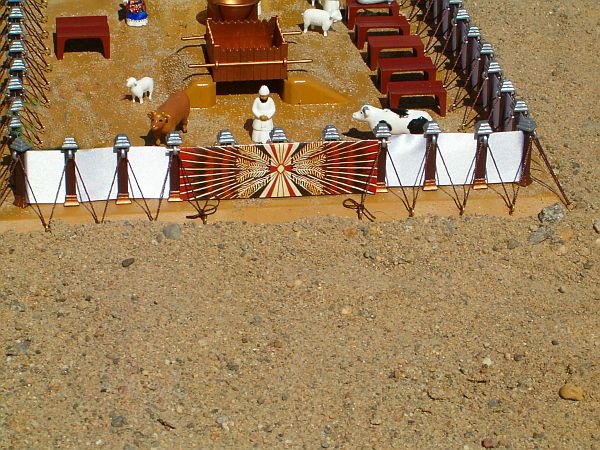
There was only one way into the Tabernacle of Moses, and it was through a curtain-door. This curtain-door of the outer court curtain-fence contained three colors woven into white linen fabric: blue, purple, crimson, and white. These four colors had deep prophetic significance.
These four colors prophetically and symbolically speak of the different attributes of Yeshua, whom Scripture likens to the door of our salvation (John 10:1–18). When combined, they form a full picture of Yeshua, the Redeemer and Savior of Israel as well as those people from the nations, who will be brought to him by the preaching of the gospel, and then will be grafted into the commonwealth or nation of Israel and its covenants with Elohim (Eph 2:11–19 cp. Rom 11:11–32). Only through Yeshua can man come to the Father, have salvation (John 14:6; Acts 4:12), eternal life and inhabit the glorious New Jerusalem as prophetically pictured by the glory cloud over the Holy of holies in the tabernacle. The four colors also correspond to the four faces of the living beings around the throne of Elohim (Ezek 1).
- The color crimson symbolizes the human aspects of Yeshua, for red is the color of man and red clay from which YHVH created man (Heb. adam meaning “ruddy, red”; cp. adama meaning “earth”). Some Bible commentators believe this points to the Gospel of Mark, which reveals the nature of Yeshua at the pashat (referring to “the simpleor plain level”) of biblical understanding. Some see this as corresponding to the ox cherubim and the tribe of Ephraim, which had on its banner an ox. According to Hebrew roots commentator and linguistic scholar James Trimm, the Gospel of Mark presents the Messiah as the servant (i.e., the servant who purifies the goyim or people of the nations in Isa 52:13, 15) and is the “my servant the Branch” of Zechariah 3:8, who is symbolized by the face of the ox in Ezekiel chapter (the ox being a servant, a beast of burden). Mark does not begin with an account of the birth of Messiah as do Matthew and Luke because, unlike the birth of a King, the birth of a servant is unimportant, all that is important is his work as a servant which began with his immersion by John. Thus Mark’s simplified account omits any account of Yeshua’s birth or preexistence and centers on his work as a servant who purifies the people of the nations.
- The color white symbolizes the righteousness of Yeshua. Some Bible commentators believe this points to the Gospel of Luke which reveals the nature of Yeshua at the remez (referring to “the hint”) level of biblical understanding. Some see this as corresponding to the man cherubim in Ezekiel chapter one and the tribe of Reuben, which had on its banner a man. Trimm states that Luke wrote a more detailed account for the high priest Theophilus (a Sadducee). The Sadducees were rationalists and sticklers for details. Luke presents Yeshua as the “Son of Man” and as “the man whose name is the Branch” (Zech 6:12), who is presented as a high priest and is symbolized by the face of the man in Ezekiel 1. Luke wants to remind by remez (or by implication) the high priest Theophilus about the redemption of the filthy high priest Joshua (Zech 6) and, therefore, its prophetic foreshadowing of a “man” who is a Messianic “Priest,” and who can purify even a high priest.
- The color purple symbolizes the regal or kingly aspects of Yeshua. Some Bible commentators believe this points to the Gospel of Matthew, which reveals the nature of Yeshua at the drash (or the allegorical or homiletical) level of biblical understanding. Some see this as corresponding to the lion cherubim and the tribe of Judah, which had on its banner a lion. Trimm writes that Matthew presents his account of Yeshua’s life as a midrash (or sermon) to the Pharisees, as a continuing story tied to various passages from the Tanakh (for example Matt 2:13–15 presents an allegorical understanding of Hos 11:1). As a drash level account of Yeshua’s kingly role, Matthew also includes a number of parables in his account. Matthew presents Messiah as the King Messiah, the Branch of David (Jer 23:5–6 and Is. 11:1f) as symbolized by the face of the lion in Ezekiel 1. Moreover, the lion corresponds to the tribe of Judah (Gen 49:9), and Scripture calls Yeshua “the Lion of the tribe of Judah” (Rev 5:5).
- The color blue symbolizes the heavenly or divine aspect of Yeshua the Messiah. Some Bible commentators believe this points to the Gospel of John as revealing the nature of Yeshua at the sod (or the mystical) level of biblical understanding more than the other Gospels. Some see this as supposedly corresponding to the eagle cherubim and the tribe of Dan, which supposedly had on its banner an eagle, although the scriptural proof for this seems to be lacking. According to Trimm, John is addressing the mystical Essene sect and concerns himself with mystical topics like light, life, truth, the way and the Word. John includes many sod-level interpretations in his account. For example John 1:1 presents a sod–level understanding of Genesis 1:1. John 3:14; 8:28 and 12:32 present a sod–level understanding of Numbers 21:9, and John 6:35–40, 50–58 of Exodus 16 with its account of the manna. (All of Trimm’s references were from his now defunct internet site http://www.jios.org/The%20Synoptic%20Solution_jt.html.)
The Altar of Sacrifice (Exod 27:1–8)
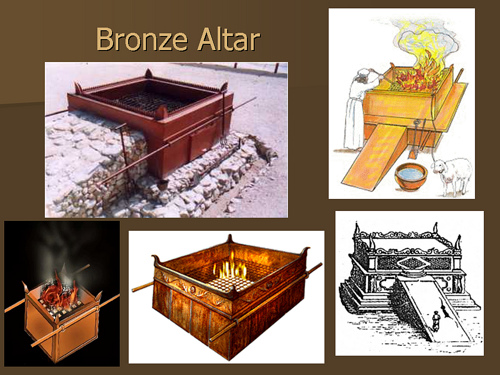
Just inside the door of the tabernacle was the altar of sacrifice. It was constructed of acacia wood overlaid with bronze. These materials are biblical prophetic symbols of Yeshua’s humanity (i.e., the wood) and his bearing the judgment for men’s sins on the cross (i.e., the bronze).
The blood of an animal that was sacrificed on the altar was poured out on the ground at the base of the altar. This prophetically pictured Yeshua shedding his blood at the cross for man’s redemption.
Two lambs were offered at the altar morning and evening (Exod 29:38–42). This pictures man’s need to come humbly before our Father in heaven morning and evening in prayerful devotion as living sacrifices to confess one’s sins as well as to praise, worship and thank him (Ps 51:16–17; Heb 13:15; 1 John 1:7–9).
Continue reading

